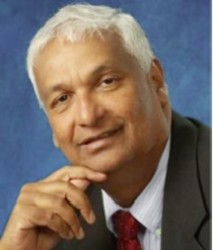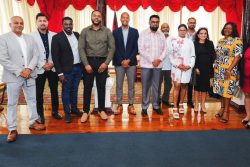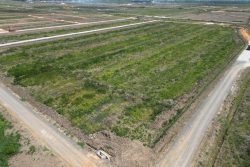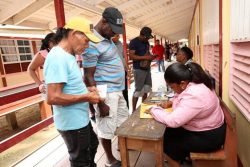Caricom foreign ministers have agreed that the Community needs to increase its participation in international bodies in order to continue to advocate for the interests of member states.
They were meeting at the sixteenth Council of Foreign and Community Relations (Cofcor) held earlier this week in Trinidad and Tobago.
A common theme in the remarks delivered was the significance of the 40th anniversary of the Caribbean Community, even though the meeting also noted that Caricom is operating in a challenging landscape.
Caricom Secretary-General Irwin LaRocque noted that this transition is taking place within the context of a dynamic and rapidly changing global environment, all of which impinged on the formulation and coordination of its foreign policy, the communiqué from the meeting said. In response, the Region must remain alert and proactive to confront these realities. “Survival in the current global environment demands a commonality of ambition and vision as well as a deep level of coordination to ensure the strategic position of the Community in the hemispheric and global arena,” he said.

Trinidad and Tobago Minister of Foreign Affairs Winston Dookeran, who chaired the Cofcor, reviewed the Community’s milestones to date, and highlighted its pivotal role at the forefront of global issues such as the fight against apartheid, the establishment of the International Criminal Court and most recently, the conclusion of the Arms Trade Treaty (ATT).
Dookeran opined that the era of diplomacy conducted in secrecy has come to an end and that diplomacy could no longer be confined to capitals but must embrace a wider cadre of participants including non-state actors. He noted the need to strategize to derive real gains from diplomatic encounters and advance and expand the political and economic space of the Caribbean. The minister also opined that that there is need for the Region to develop a diplomatic corps equipped to advance its interests in the changing environment. To this end, the Government of Trinidad and Tobago in partnership with the Institute of International Relations University of the University of the West Indies will establish a Diplomatic Academy. Dookeran also said there is need for increased convergence and adjustment of traditional multilateral diplomatic practices to accommodate a multi-track approach to trade and investment relations.
Candidatures
The meeting also underscored the importance of Caricom’s participation in international bodies of importance to the Region, particularly where representation is limited. Ministers endorsed a number of Caricom candidatures in this regard.
The Council welcomed the successful conclusion of the negotiations of the ATT by the United Nations in April 2013. In this regard, it underlined the important role played by the Community, in collaboration with a number of external partners, in this achievement. The Council agreed on the symbolic importance of the early signature and ratification of the Treaty by member states and hoped that the rigorous implementation of the implementation of the ATT will lead to a decrease in the illegal trade of Small Arms And Light Weapons (SALW) which contribute to increasing levels of crime and violence in the Region.
Guyana-Venezuela relations
 The ministers noted that Guyana and Venezuela continue to enjoy excellent relations conducted through regular high level political consultations and a vibrant programme of functional cooperation. They noted that both countries remained committed to the Good Offices Process of the United Nations Secretary General under the Geneva Agreement of 1966 and reaffirmed their support for the sovereignty and territorial integrity of Guyana.
The ministers noted that Guyana and Venezuela continue to enjoy excellent relations conducted through regular high level political consultations and a vibrant programme of functional cooperation. They noted that both countries remained committed to the Good Offices Process of the United Nations Secretary General under the Geneva Agreement of 1966 and reaffirmed their support for the sovereignty and territorial integrity of Guyana.
Belize-Guatemala
The Council also received an update on the efforts of Belize and Guatemala to find a final and definitive resolution to the Guatemala claim. They expressed concern that Guatemala is reneging on the agreement to hold a referendum on October 6, 2013 in accordance with the Special Agreement between Belize and Guatemala to submit Guatemala’s Territorial, Insular and Maritime claims to the International Court of Justice of 2008, and emphasized the importance of preserving the Special Agreement which commits both parties to resorting to the Court for a final determination of the Guatemalan claim. Cofcor urged the parties to set a new date for holding the simultaneous referendum in the shortest possible time and called on the international community to continue supporting the process under the Organization of American States (OAS) and to engage the parties to assist in their efforts to reach a final settlement. They commended the OAS Secretary General for his Good Offices and for the role of the OAS in the Adjacency Zone.
The ministers also discussed relations with a number of partner countries which the Community is expected to engage at the bilateral level over the course of 2013. Acknowledging the social, political and economic support that Venezuela has given Caricom member states and its peoples, the ministers underscored the importance of continuing positive relations with that country at the bilateral and the Community level. The Council also reviewed the ongoing cooperation activities with Mexico.
In preparation for coming meetings, discussions took place with regard to the agenda for the Second Caricom-Brazil Summit to be held in Paramaribo, Suriname; for the upcoming Fourth Caricom-Cuba Meeting of Foreign Ministers to be held in Grenada later this year at a date to be confirmed; and for the forthcoming meeting with US Vice President Joe Biden later this month.
The Council considered the changing relationship between the Community and the European Union and emphasized the need to strengthen political dialogue between the parties. It also acknowledged the strengthening of relations with a number of countries of South Asia and reviewed the Community’s economic and political engagement with these countries.
Attention was also paid to the Twenty Third Common-wealth Heads of Government Meeting set for Sri Lanka in November and member states committed to participating fully in that meeting.
The ministers also recalled the Sipopo Declaration issued at the conclusion of the Seventh Summit of Heads of State and Government of the African, Caribbean and Pacific (ACP) Group held in Equatorial Guinea in December 2012. Regarding the EU’s new development policy, the ministers expressed concern that the implementation of differentiation in apportioning aid would result in a significant reduction of development assistance for ACP states.
The Council also discussed matters of particular relevance to the Community being considered under the aegis of the United Nations. In view of decreasing attention being paid to the peculiarities and vulnerabilities of Small Island Developing States (SIDS) by the international community, the Cofcor highlighted the importance of using several coming events as platforms to highlight and advocate for the interests of SIDS. These include the coming global negotiations on the post 2015 development agenda, the commemoration in 2014 of the year of Small Island States, as well as the Global Conference on Small Island Developing States to be held in Apia, Samoa, in 2014. In this latter regard the ministers committed to fully participate in the preparatory meetings, including the regional meeting to be held in Jamaica in June and the inter-regional meeting in Barbados in September.







